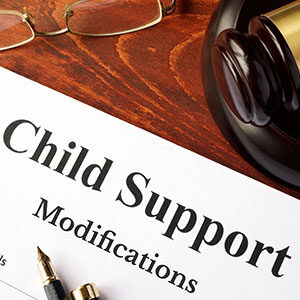Navigating child support cases in Texas can be challenging, but understanding and advocating for your rights is crucial. This comprehensive guide provides actionable advice on ensuring fair child support decisions, understanding your rights, and effectively presenting your case in court.
Understanding Child Support Rights in Texas
Before diving into advocacy strategies, it’s important to understand the basics of child support rights in Texas. Child support is designed to ensure the financial well-being of the child after a separation or divorce. Texas law considers various factors like income, the child’s needs, and custody arrangements.
As a parent, you have the right to request a fair and reasonable support amount that aligns with these factors.The state ensures that child support aligns with both the child’s needs and the parent’s ability to pay. At Daniel Ogbeide Law, we can help you navigate these laws to ensure a fair outcome for your family.
Knowing When to Request a Modification
Life circumstances change, and so do the needs of your child. Texas law allows for child support modifications when there’s a significant change in circumstances. This can include a change in income, job loss, or a shift in the child’s needs. Be vigilant about changes in your life or your child’s that might necessitate a modification.Regular reviews of child support arrangements are encouraged to reflect current life situations.
Preparing for the Modification Process
Once you’ve identified the need for a modification, preparation is key. Start by gathering relevant documentation, such as financial records, proof of income changes, and evidence of your child’s changing needs. This documentation will be crucial in court to substantiate your claim.Proper documentation can significantly streamline the modification process.
Filing a Petition
The next step is to file a petition with the court for a modification. This legal document should clearly state the reasons for the requested change. It’s advisable to consult with a family law attorney who can help ensure that the petition is filed correctly and efficiently. An accurately filed petition can prevent unnecessary delays in the modification process. At Daniel Ogbeide Law, we specialize in preparing and filing these petitions, offering our expertise to ensure your case is handled with precision and care.
Effective Communication in Court
When presenting your case in court, clear and effective communication is vital. Articulate the reasons for the modification request and how it reflects the child’s best interests. Be prepared to answer questions from the judge and present your evidence logically and coherently. A well-prepared presentation in court can greatly influence the outcome of your case.
Utilizing Legal Representation
Having an experienced family law attorney can make a significant difference. An attorney will not only guide you through the legal process but also help you present a strong case. They can negotiate on your behalf and ensure that your child support rights in Texas are fully protected. A skilled attorney can also assist in interpreting complex legal jargon and provide personalized advice based on your specific circumstances.
Additionally, they can manage all legal communications, allowing you to focus on your family’s well-being.At Daniel Ogbeide Law, our seasoned lawyers are adept at handling these nuances, offering unparalleled support and expertise in child support cases.
Understanding the Court’s Perspective
It’s crucial to understand how courts in Texas view child support cases. The primary consideration is always the best interest of the child. Courts look at factors like the child’s physical and emotional needs, the ability of parents to provide support, and any special circumstances that might affect the child’s well-being.
Judges in Texas also consider each parent’s financial stability and their historical relationship with the child when making decisions. Understanding these factors can help you better prepare your case for the court.
Negotiating with the Other Parent
In some cases, reaching an agreement with the other parent outside of court is possible. This can be done through informal negotiations or mediation. Remember, the goal is to reach an agreement that serves the child’s best interests while respecting both parents’ financial capabilities.Effective communication and willingness to compromise are key in these negotiations. Seeking legal advice during negotiations can ensure that your rights are not compromised.
The Role of Mediation
Mediation can be a valuable tool in resolving child support disputes. It involves a neutral third party who helps facilitate discussions and negotiations between the parents. Mediation can lead to a more amicable resolution and is often less stressful for all parties involved.Mediators are trained to handle sensitive family dynamics and can help find common ground. Additionally, mediation often results in more durable agreements as both parties have a hand in shaping the outcome.
Staying Informed and Proactive
Staying informed about your rights and responsibilities is essential. Keep abreast of any changes in Texas family law that might impact your child support case. Being proactive in your case shows the court that you are committed to your child’s welfare.Regularly consulting with a legal professional, like our adept child custody lawyers in Houston, can help you stay updated on new developments in family law. It’s also beneficial to join support groups or forums where you can learn from the experiences of others in similar situations.
The Impact of Legal Changes on Your Case
Family law is continually evolving. Stay informed about legal changes in Texas that could impact child support cases. This includes changes in laws, court rulings, and guidelines for calculating support.Subscribing to legal newsletters or following family law blogs can be an effective way to stay informed. Additionally, attending workshops or seminars on family law can provide valuable insights and strategies for your case.
Seeking Support and Guidance
Navigating child support cases can be emotionally taxing. Don’t hesitate to seek support from family, friends, or professional counselors. Additionally, legal guidance from a family law attorney can provide clarity and peace of mind.Establishing a support network can help you manage the emotional challenges of a child support case. Remember, taking care of your mental and emotional health is just as important as addressing legal matters.
Get the Support You Need Today
Advocating for your child support rights in Texas requires understanding the law, preparing thoroughly, and presenting your case effectively. Whether through negotiation, mediation, or court proceedings, your goal is to ensure the best possible outcome for your child. Remember, you don’t have to navigate this process alone. As your trusted family law attorney in Houston, the legal professionals at Daniel Ogbeide Law are here to guide and support you every step of the way.
Ready to ensure the best for your child? Get in touch with Daniel Ogbeide Law for dedicated assistance in your child support case. Our experienced team, including skilled custody attorneys, divorce lawyers, and CPS attorney in Houston TX, is well-versed in Texas family law and committed to advocating for your rights and your child’s well-being. Whether you need help filing a petition, negotiating a fair agreement, or representing your interests in court, we’re here to guide you every step of the way.
Don’t navigate this journey alone; let us be your ally. Call us today at (832) 345-1988 or fill out our contact form to schedule a consultation. Start advocating for your child support rights with confidence, supported by your family lawyer in Houston.
Disclaimer: This article is only intended for educational purposes and shouldn’t be used as a substitute for legal advice.























